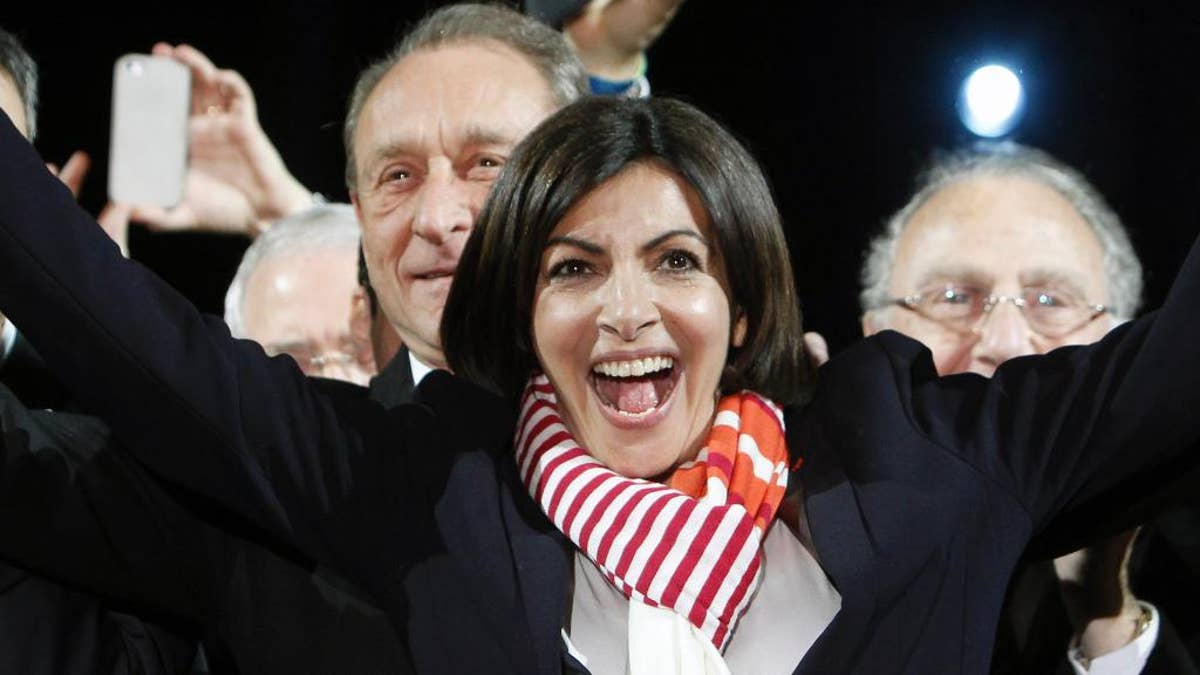
French Socialist Party deputy mayor of Paris, Anne Hidalgo, center, smiles, as outgoing mayor Bertrand Delanoe, stands behind her, during a speech after results were announced in the second round of the French municipal elections, in Paris, Sunday, March 30, 2014. Hidalgo saved Paris for the flagging Socialist Party in Sunday's municipal elections, becoming the French capital's first female mayor. (AP Photo/Thibault Camus) (The Associated Press)
PARIS – She wants to make Paris a greener place, make it more fun to wait in line at the Eiffel Tower, keep the subway open until the wee hours. But one of the most remarkable things about this city's new Mayor Anne Hidalgo is that she's a she.
The low-profile, Spanish-born Hidalgo became the French capital's first female mayor in elections Sunday thanks to her long experience in City Hall and a pointed effort to distance herself from a highly unpopular fellow Socialist: President Francois Hollande.
She toiled for more than a decade in the shadow of her mentor, Bertrand Delanoe, laying the plans for one of Paris' biggest construction projects, rejuvenating its open-air markets, taking on the unglamorous task of adding new hotel rooms to a tourist city in dire need.
After a deliberately uncharismatic campaign in keeping with her image as a hardworking civil servant, Hidalgo is "deputy" no more.
"For a long time now, I've gone my own way, without having a team of spokespeople telling me you need to be aggressive to succeed," Hidalgo told The Associated Press in a recent interview. "I've taken part in this transformation at Bertrand Delanoe's side, and I want to write a new page in which Paris is both a powerful and gracious city."
With visitors outnumbering residents more than 10 to 1, running a city that thrives — and profits — on its ability to appear the same year after year, Hidalgo is responsible for an unusual constituency. Her ability to maneuver will be severely limited by shrinking budgets and the Socialists' unpopularity, which hit home in the election losses Sunday throughout the country.
The losses were so severe that France's government resigned Monday ahead of a reshuffle aimed at boosting its popularity.
In an interview with Europe 1 radio, Hidalgo said Hollande called her Sunday evening to offer congratulations for her victory.
"He told me that it was good news in an ocean of bad news," she said.
Among her plans for the city:
— Encouraging small merchants at some of the city's 82 markets, allowing them to expand hours, link up with local schools for lunches and deliver their goods more easily. She's also making it easier to open mobile street food stands, although she promises they won't compete with restaurants.
— Creating an underground welcome area at the Eiffel Tower, where lines routinely stretch for hours in even the worst weather, curling around each other at the base as visitors jostle for space and dodge pickpockets.
— Expanding metro hours on nights and weekends, and improving train access to the airports, especially Charles de Gaulle; adding up to 12,000 hotel rooms.
— Adding green space in la Petite Ceinture — an abandoned 19th century railway. Hidalgo's proposal verges on the far-fetched — in addition to a green beltway through Paris, she wants to use the tunnels for farming fish and mushrooms. She also wants to expand a walkway along the banks of the Seine and the newly fashionable canal district.
___
Sylvie Corbet and Angela Charlton in Paris contributed to this report.
Follow Lori Hinnant at : https://twitter.com/lhinnant







































